
Dear friends, Dali is not only famous for its natural beauty and cultural scenes, but for its folk customs and specialities such as the 3 courses tea, wedding ceremony, Dali March Fair, Torch Festival, Raoshangling, Shibao Mountain folksong Competition, Bai People's Protection God Day, Bai Residence, Marble Picture, Tie Dying, Jianchuan Wood Carvings, Dali Camellia, etc.
|
|
They are all colorful and attractive to visitors home and abroad. VIPs, poets, businessmen, and common people have frequently visited Dali. From ancient time until now, especially since open-door policy has been carried out in China, Dali has become a pilgrim for all kinds of travelers |
| March Fair is named Avalokistevara Market. It has over 1000 years history. The legend has it that once upon a time, Avalokistevara came to Dali. She used Bai language to preach. More and more audience came to hear the sermon. So a fair was made up. Because Dali used to be a trading port on Bonan Ancient Road-south Silver Road, Dali market economy developed greatly, and a fair with unique folk customs has been evolved gradually. |  |
 |
"March Fair has a grand opening once every year. People come from all corners of the country. People are singing in unison. They have horse racing, song competition, and transactions". This song vividly describes the hot and lovely scene of March Fair. |
| Building new house is one of the biggest events for the Bai People. When the frame of the house is set up, the owner of the new house have to get down on their knees for the house. They wish the house would give them a warm and stable home and protect them forever. People in the countryside are still building house like this. However, nowadays, more and more people use modern building materials--the reinforced concrete to build their houses in towns. |  |
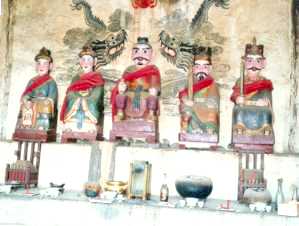 |
Most of our Bai people are Buddhists, but I can say all of us have a different religion: we worship the local Village Lord (just like God). Every village has its own temple for the Lord. This Lord was actually a hero or lady-hero in the past, people considered him or her as a symbol of justice and consider him or her as a guardian. Sometimes a village puts the husband as their Village Lord and another village puts the wife as their Village Lord. |
| The Village Lords have their birthdays too. When their birthdays come, the villagers will get together to celebrate it in the temple. One villager has to go the Village Lord's temple to open the door, clean the temple and burn joss sticks every day. The villagers do this in turns, for example, today is your turn to go the temple and tomorrow will be mine. |  |
 |
Bawangbian is the most popular Bai dancing. Women
use a kind whip called Power Whips as their props. Dongjing Music is also
very popular in this area. Thye ususlly played by old people.
|
| The torch festival is a grand fire ceremony celebrated by Bai, Yi, Naxi, Lisu, Pumi, Lahu, Hani and Jinu minority nationalities of southwest China. Among them, the Bai and Yi minority nationalities celebrate it in the most grand way. The Bai celebrate it on June 25 of the lunar calendar, while the Yi on July 20-22 every year. |
|
|
|
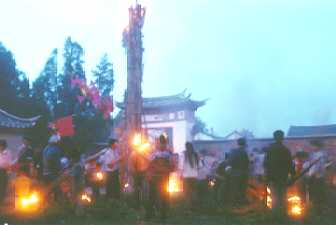 |
 |
The 3-course Bai Tea is a tipical drink here in Dali. Mr. China's son offer this tea in his Mr. China's son Cultural Cafe. The 3-course Bai Tea refers to Bitter Tea, Sweet Tea, and After-flavor Tea. The first course of bitter tea is also named "Baked Tea". It tastes bitter at first, then it tastes sweet. It functions to quench thirst and recover from fatigue. The second course of tea is sweet tea. This tea can delight a person. The third course is after-flavor tea. It consists of ingredients such as prickly ash. It tastes dry and fragrant, with a long after-flavor. The tea reflects the life experience of the people. |
| Bai people practices a custom of monogamy. Interracial marriage is allowed. Household is small. Children usually have their own house after marriage. Parents usually live with the youngest child. a husband who lives in the wife's house has to change his family name to wife's family name. Then he has the right to have heritage. Women usually take control of the family, of Course, this depends on who is more powerful in the family! | 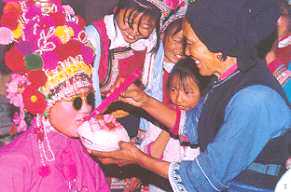 |
 |
Before marriage, young men and women are free. They usually get to know each other in public activities and holiday ceremonies. They are free to fall in love with each other. After that, they have to have a go-between invited by their parents. They will have a "Eight Diagrams" check to see if they are in harmonious. They then will choose an auspicious day to have a chicken-wine engagement day. On this day, the young man's family has to send a bottle of wine, a cock, and some money to the young woman's family. The 2 families will have dinner together in the evening. |
 |
This is the sedan! |
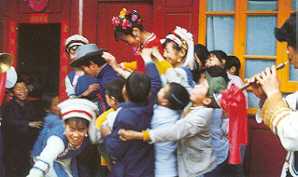 |
| The wedding is very grandiose and serious. A standard wedding ceremony holds for three days. The last day is the most active day. The bridegroom will take bride home with a colorful sedan. The bride should weep to say farewell to her parents. Sauna instrument will play all way to the bridegroom's home. Small boys and girls throng after the bride, they spray pop rice to the bride. They all try to pinch the bride with their fingers as a ritual of "greeting with happiness". The bride uses scissors to threaten small boys and girls away with "good-heart" until she reaches her wedding house. |
|
Raoshangling Days |
 |
 |
It is a kind of holidays observed in the leisure time to welcome God and entertain villagers themselves. The holidays are observed from April 23 to 25 every lunar calendar year. At this time, villagers from around Erhai Lake, men and women, young and old come out in their best dresses, and they line up in a long queue, which looks like a snake line. |
| Usually, a line of Raoshangling consists of villagers from one village, headed by two old villagers with willow branches, ox tail and white towel. While walking, they, in pairs, sing Bai Tune "Flower and Willow". Some people in the Raoshangling line sing songs, some perform another Bai dance, the Double Flying Swallows. Raoshangling usually attracts thousands upon thousands of paraders. Different villages orgnizes their line, parades from their own village. | 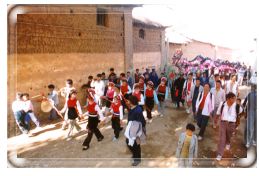 |
 I I |
In the daytime, people sing and dance, the route of Raoshangling is full of happy songs and laughters. In the evening, villagers set up campfire in small groups, cooking food and preparing tea. After dinner, old men play with their three chord instruments, singing their Dabeng Tune. While the young people will go dating in the woods. |
| Raoshangling is one of our Bai people's carnival. The scene is vividly described in a poem: "Copper coins, drums, and power whips are making retty sounds. Dancers swing around in pairs. The mopst beautiful songs come from the Bai young ladies. So moving and so touching, the sky falls in love with their songs". |  |
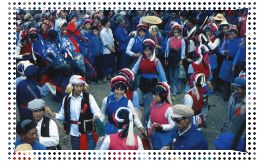 |
Dali has a long history and it has been developing very fast and so there are quite a lot of unique features. However, lots of tourist resources are still unexplored. In order to display Dali, we make this page. We'll try our best to build up this page bit by bit and let visitors on the Internet enjoy more and more. There are many other minorities in Dali area. They have their own customs, too. This page is only about some of the Bai features. We will make more pages about our Bai as well as other minorities later. Back to Top |